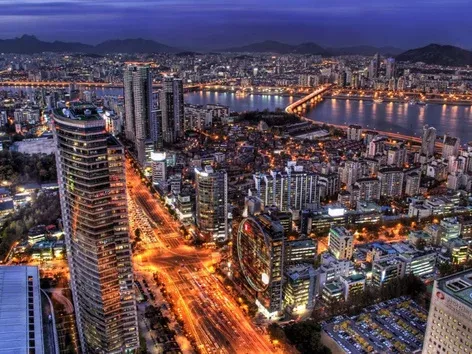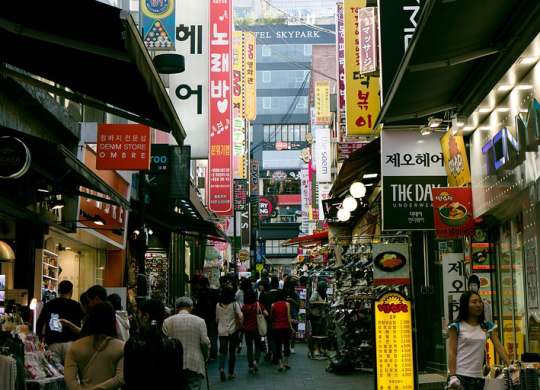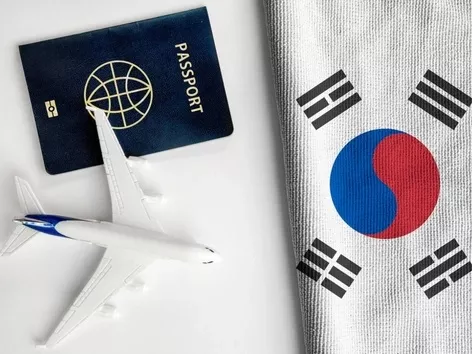Pros and cons of living in South Korea: what is important for expats to know?
Table of contents
-
Pros of moving to South Korea
- 1. Beautiful nature
- 2. You can plan your move in advance
- 3. High level of security
- 4. The health care system is developed
- 5. One of the best transport infrastructures in the world
- 6. Delicious cuisine
- 7. Effective system
- 8. 24-hour shops
- 9. Ideal opportunities for waste sorting
- 10. A large community of migrants
- 11. Friendly working environment and career prospects
- 12. High level of the education system
- Cons of living in South Korea

Life in South Korea will provide expats with many opportunities, but it also comes at a price. When planning to move here, you should be prepared for certain advantages and disadvantages. Find out what are the pros and cons of living in South Korea and what to pay attention to when planning a move to the country
Many reasons motivate people to change their country of residence, it can be employment prospects and new career opportunities, as well as the desire to live in another country, learn a new culture or find a more comfortable climate for themselves.
South Korea is a popular expat destination because it has a lot to offer foreigners. However, as in any other country in the world, life here has certain drawbacks.
We talk about the pros and cons of moving to South Korea.
Are you planning to move abroad or want to understand the migration rules of your chosen country?
The Immigration Guide from Visit World is a convenient and understandable guide that will help you go from the first application to legal residence without unnecessary stress. All relevant information is collected in one PDF document and sent to your email in just a few minutes.
Take the first step to life abroad confidently and prepared!
Pros of moving to South Korea
1. Beautiful nature
Photo – LonelyPlanet
70% of the territory of South Korea is hills and mountainous terrain. There are also many rivers here, the local nature is simply amazing with its beauty.
2. You can plan your move in advance
Usually, expats move to South Korea with an existing employment contract and also have a signed apartment rental agreement. Such conditions greatly ease the stress of moving.
3. High level of security
South Korea has a very low crime rate. You can easily leave your belongings anywhere and find them untouched a few hours later. Also, expats don't have to worry about armed robberies and petty crimes in South Korea.
4. The health care system is developed
The health care system in the country is developed at a very high level. It is also affordable. Medical bills won't burden your budget even if you don't have insurance.
5. One of the best transport infrastructures in the world
South Korea has a well-developed and modern transportation infrastructure that makes it easy to get around even without a car. Public transport is one of the best in the world, boasting train, metro, bus and taxi services linked by a single card that can be used anywhere in the country.
6. Delicious cuisine
Photo by RemoteLands
Food is the foundation of South Korean culture. There are many dishes based on dashi, soy sauce, seaweed and sesame oil.
Restaurants in South Korea offer fast service and no tipping, so they are ideal.
South Korean coffee shops are comfortable, modern, diverse and creative, despite the fact that the coffee culture here is quite new.
The number of non-Korean restaurants and ingredients is increasing due to the growth of the foreign population.
7. Effective system
One of the best things about South Korea is that everything works flawlessly.
People respond quickly to emails, are never late, and always get back to you on time.
Also, they take their work very seriously.
The postal service is reliable and fast, and all government services operate efficiently.
Also, there are never any problems with transportation, electricity or infrastructure.
8. 24-hour shops
You don't have to go far to find a 24-hour convenience store in South Korean cities.
Here you can buy anything: from personal hygiene products to food, alcohol, ready meals and snacks.
9. Ideal opportunities for waste sorting
Waste disposal regulations in South Korea are strict and you can be fined if you don't recycle your waste.
There are color-coded bags to separate plastic bottles, food waste, glass bottles, Styrofoam and paper.
10. A large community of migrants
Friendship with other foreigners helps reduce culture shock. There are many meetings and parties where you can make new friends.
11. Friendly working environment and career prospects
Koreans value relationships between colleagues and often spend time together even after work. Also, South Korea can offer an expat fantastic prospects for career development.
12. High level of the education system
Korean public elementary and middle schools are generally quite good and focus on science and math, as well as English and Korean. Many schools also hire native English speakers, even in rural areas.
Moving to another country requires preparation and careful planning. If you are considering South Korea as your future residence, it is important to have a clear understanding of the process of obtaining a residence permit here. We have already talked about the procedure for submitting documents and obtaining a visa to South Korea.
Cons of living in South Korea
1. High cost of living
The cost of living in South Korea can be quite high. Apartments in major cities can cost up to SGD 1,600 ($1,200). Expenses for communal services are usually combined into one account. Outside the city, rental prices are not so high.
Locally produced products are cheap, but if you want imported products, you will have to pay a lot more.
2. Polluted air
Photo – npr.org
Air pollution is a serious problem in South Korea, especially in Seoul, the capital. Seoul is one of the cities with the highest level of air pollution in the world. However, the rapid industrialization in the country is most to blame for this.
3. Unstable weather
The Asian monsoon affects the climate of South Korea: cold air from Asia prevails in winter, and warm and humid air from tropical regions enters the country in summer.
This means that the rainfall pattern is not what you would expect, with winter being the driest and summer being the wettest.
4. Small apartments
If you plan to rent an apartment in Seoul, expats should be prepared that the apartments will be much smaller than by Western standards. The further an expat moves from the city, the more spacious the accommodation becomes. Despite this, the prices for renting a small space, especially in Seoul, will be high.
5. Tense atmosphere
South Korea has a remarkably high suicide rate, partly because of the stressful atmosphere surrounding education, as students are constantly required to perform better and study longer to get into a prestigious university.
6. It is difficult to develop startups
South Korea's economy is strong, but with giant corporations like LG, Samsung, and Hyundai, it's hard for startups to get ahead in society. More than 11% of young people cannot find a job here.
7. Language barrier
Although young people in Seoul can speak some English, you may encounter language barriers, especially when dealing with government agencies or older generations.
8. Traffic jams
Rush hour traffic can be a real headache in Seoul, making commuting to and from work frustrating.
Working in South Korea offers an exciting immersion in a dynamic mix of tradition and innovation. With its rich cultural heritage and fast-growing economy, the country offers a unique experience for both local and foreign professionals. Before starting the job search procedure, find out about the available types of work visas in the country and what the procedure for obtaining a permit is.
Life in South Korea is different, it has both its advantages - career prospects, beautiful nature, rich culture, and disadvantages - high cost of living or language barrier. What experience you will get from life in South Korea will depend on your preferences and how well you can adapt to new challenges.
Moving to South Korea requires not only desire, but also a clear understanding of migration procedures, requirements for foreigners and available grounds for legal residence. The Immigration Guide from Visit World will help you understand in detail how to obtain a residence permit or citizenship in South Korea: from the list of required documents and the cost of processing to the deadlines for considering applications and requirements for the applicant.
In the guide you will find step-by-step instructions, contacts of responsible government agencies, rules for filling out questionnaires and practical advice that will greatly simplify the moving process. Get up-to-date and verified information in one PDF file and prepare for life in South Korea without unnecessary risks and mistakes!
We will remind you! Portugal is a popular relocation destination due to its mild climate, safety, and friendliness towards foreigners. In this article, we look at the real pros and cons of living there, the conditions for moving to the country, costs, adaptation, and experience.
Products from Visit World for a comfortable trip:
Checklist for obtaining a visa and necessary documents in South Korea;
Legal advice on immigration to South Korea;
Travel insurance for foreigners in South Korea;
Medical insurance all over the world.
We monitor the accuracy and relevance of our information. Therefore, if you see any error or discrepancy, please write to our hotline.
Frequantly
asked questions
Is moving to South Korea a good idea?
Is life busy in South Korea?
Are South Koreans kind to foreigners?
How much salary is enough to live in South Korea?
Recommended articles
2 min
Residence permit
How to move to South Korea: available ways to obtain a residence permit in 2025
South Korea offers a variety of immigration options that allow foreigners to integrate into society and access social services. Find out what options there are for obtaining a residence permit in South Korea, as well as the document requirements and conditions for obtaining a residence permit
29 Apr. 2025
More details3 min
Treatment
Medicine in South Korea for foreigners: insurance, hospitals and useful tips
South Korea offers one of the most modern and efficient healthcare systems in the world, making the country attractive to both locals and foreigners. Learn about the South Korean healthcare system in 2025: health insurance for foreigners, best hospitals, traditional medicine, cost of services and tips for tourists and expats
25 Sep. 2025
More details1 min
Travels
South Korea has introduced an electronic arrival card, replacing traditional paper forms for travelers, effective February 24, 2025. The initiative aims to simplify the entry process and increase the efficiency of immigration procedures. Find out what a Korean electronic arrival card is, who needs it, and how to apply for one.
02 Mar. 2025
More details1 min
Work
South Korea is introducing a new “High-Level Visa” to attract foreign professionals in the fields of technology and science. Find out who can get this visa, what benefits it provides, and what other migration programs the government plans to introduce in 2025
15 Mar. 2025
More detailsAll materials and articles are owned by VisitWorld.Today and are protected by international intellectual property regulations. When using materials, approval from VisitWorld.Today is required.
